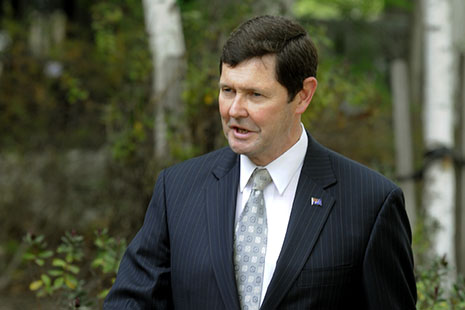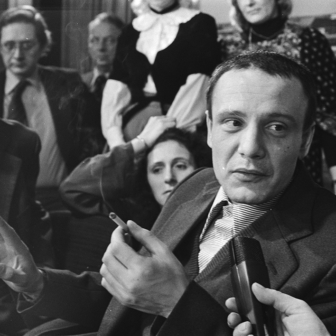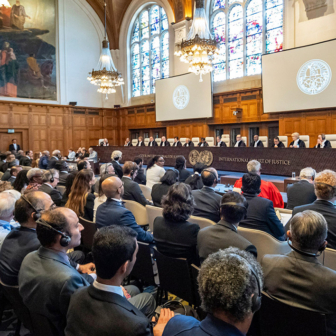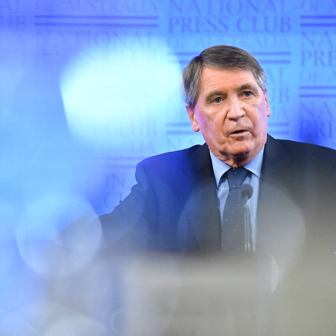ON 22 SEPTEMBER LAST YEAR, in a sunny room in the Sydney Convention Centre overlooking Darling Harbour, the official inquiry into what has become known as the Haneef Affair held its only major public proceeding. This “community forum” owed its existence to a commitment given by the attorney-general, Robert McClelland, when he announced the inquiry. Exactly what purpose he had in mind for the forum was not terribly clear; nor was it evident how the proceedings might complement the inquiry’s investigation of the circumstances surrounding the protracted detention and bungled charging of Mohamed Haneef. In his final report, however, the head of the inquiry, the Hon John Clarke QC, stated that the forum enabled the airing of “arguments about the strengths and weaknesses of aspects of Australia’s counter-terrorism laws.”
One thing the forum did do, unintentionally, was highlight the false dichotomy that plagued the development – and, in Haneef’s case, the operation – of Australian counter-terrorism law and policy. The inquiry chose to bestow on the event the catchy but simplistic title of “Too Safe or Too Sorry?” It is hard to imagine a more loaded premise from which to commence a debate about anti-terrorism laws. As everyone knows, it is always better to be safe than sorry.
In couching the forum in this way, the inquiry reinforced the perception that the community is faced with a crude choice between security and liberty. Even when this is presented as an attempt to strike a “balance,” the clear implication is that security is only increased when liberty is sacrificed. Sadly, it’s an all too familiar message for Australians. Over the years after 11 September 2001, the Howard government repeatedly used this unsophisticated trade-off to justify the steady introduction of ever more elaborate anti-terrorism measures which sat uneasily alongside our familiar freedoms and rights.
Reading Clarke’s account of the twists and turns of the Haneef affair, I was struck by the pernicious influence of this mindset on many of the key players. Nowhere was this more apparent than at the point when, for many onlookers, the case took on a truly bizarre complexion. This was the decision, after twelve days of extended detention and investigation of Haneef, to charge him with providing support to a terrorist organisation having been reckless as to its character. The central fact on which that charge depended was that Haneef, when he departed England over a year earlier, had given his mobile phone SIM card to his cousin Sabeel Ahmed so the latter could make use of its remaining free calls. In late June 2007, it was Sabeel’s brother Kafeel who drove a jeep laden with explosive material into the doors of Glasgow International Airport in a spectacularly unsuccessful terrorist attack.
It makes for revealing yet ultimately depressing reading to see just how little confidence many of those working on the investigation had in the case against Haneef and yet how powerless they were to halt its momentum. The range of people who had doubts about whether a charge should be laid extended from the arresting and interviewing officers of the Australian Federal Police to senior members of the Queensland Police Service. Alone among the investigation team, according to Clarke, AFP Comander Ramzi Jabbour had come to hold “a strong personal view that Dr Haneef was implicated in the British terrorist acts, despite his inability to uncover any substantial piece of evidence on which to anchor that belief.” Although Clarke described Jabbour as “an impressive, dedicated and capable police officer,” surely there can be no more worrying assessment of the officer then responsible for overall management of the AFP’s Counter Terrorism Domestic Operations than to say that he “had lost objectivity”?
Crucial to the decision to charge Haneef despite the qualms of all officers but Jabbour was the advice tendered to the AFP by Clive Porritt of the office of the Commonwealth Director of Public Prosecutions. Many members of the investigating team rejected the argument that the CDPP advice mandated the laying of a charge, and both the interviewing officers refused to take this step on the strength of the advice. But its mere existence powerfully increased the possibility that the AFP would proceed down this path. That was particularly so since Jabbour and his boss, Asistant Commissioner Prendergast, felt the advice “effectively left them with no choice” but to charge Haneef. As Clarke found, Porritt’s advice was relied on not because it was any good but simply “because it was there.”
How did the DPP come to give the AFP the green light to charge? The office had been brought into the picture very late in the day: Porritt did not meet with the investigating team until ten days after Haneef had been arrested. At that meeting, Porritt was informed that Haneef’s SIM card had been found on Kafeel Ahmed at Glasgow airport – an inaccuracy which was corrected the following day by the AFP in the briefing paper for Porritt, but was never specifically drawn to his attention. The paper also made much of Haneef’s attempted flight of Australia without adequately highlighting his explanation of his travel plans and his attempts to contact the Metropolitan Police in Britain. The AFP also incorrectly told DPP that Haneef and his cousins had shared a house – expressly denied by Haneef in his interview – and suggested there was evidence of Sabeel Ahmed holding “radical views.”
Even more worrying than this inaccurate information was the failure of the AFP to reveal the transcript of interview to the DPP or pass on key facts that seriously undermined the case against Haneef. Foremost among these was the existence of email communication apparently establishing that Sabeel Ahmed had no involvement in his brother’s plot. It was this email – sent to Sabeel just 75 minutes before the attack and opened by him after it had occurred – that led to the rather zealous prosecution of him on the charge of withholding information that could have assisted police to secure the apprehension, prosecution or conviction of the perpetrator of a terrorism crime. He is now serving an eighteen-month sentence, but ironically that offence only underlines the absence of any meaningful connection that Sabeel might have provided between Haneef and the actions of Kafeel Ahmed. There simply was no “terrorist organisation” to which Haneef provided support.
It beggars belief that the contents of this crucial piece of evidence was not revealed to DPP staff until after the charge against Haneef had been withdrawn. Clarke accepted that the British authorities had imposed restrictions on its dissemination, but noted that other information which was similarly restricted appeared in the briefing paper provided to Porritt. Although he declined to say whether the AFP’s non-disclosure of the email was justified, Clarke said that simply revealing to Porritt the existence of the correspondence, even without details, would have put him on notice that he did not have “the full picture.”
While Porritt was undoubtedly in the dark on some of the underlying facts, his own actions still attracted stern criticism in Clarke’s report. Porritt had failed to communicate at all adequately with his supervisor throughout his involvement with the case; in writing his advice, he was muddled as to the end in mind. In his subsequent oral statement to Clarke, Porritt claimed to have supplied the advice as to the sufficiency of evidence sustaining arrest, but the AFP not unreasonably interpreted the document as supporting prosecution of a charge. When clarification of the advice was sought, Porritt failed to stress its limits. Clarke concluded that Porritt’s advice was “obviously wrong and should never have been given.”
THE QUESTION of why, then, it was given takes us back to the perilous impact of the “safe or sorry” logic on orthodox criminal procedures. Although Porritt denied that the “unspoken pressure” on him to support a charge impaired his judgment, Clarke found to the contrary. What can be said of a prosecutor who admits he was “loath to say no” to police? But while Clarke made no bones about Porritt’s failure to carefully assess the evidence for himself, he accepted that the case was presented to the prosecutor by Jabbour in such a confident light as to fail to meet the standard required by the Memorandum of Understanding between the AFP and the Commonwealth DPP. The bottom line from Clarke is that Porritt was operating under a “subconscious desire to provide positive reassurance” to a senior investigating officer who had “lost objectivity” – a fatal combination.
Of course it was not the actions of these lesser figures which most excited public reaction at the time, but those of immigration minister, Kevin Andrews, when he cancelled Dr Haneef’s visa just shortly after he had been granted bail. The likely result of Andrews’ intervention was not to deport Haneef immediately but rather to ensure that he would remain in some form of detention until his trial under a criminal justice stay certificate.
Andrews had two exculpatory tools at his disposal in defending his decision to revoke the visa. One was that, ludicrous as it might seem, existing judicial authority on use of the “character test” under the Migration Act conferred on the minister a virtually unfettered discretion in respect of the visas of non-citizens regardless of the nature of their “association” with others suspected of criminal activity. The Federal Court subsequently rejected such a broad interpretation of the power, but at the time he acted Andrews had the law on his side. The second thing on which he relied was the “national interest” in using all caution in respect of Haneef. Better, as they say, to be safe than sorry.
Andrews, like Jabbour before him, was not prepared to be swayed in the least by ASIO’s repeated insistence that there was no evidence whatsoever linking Haneef to the recent events in Britain. Andrews knew of the broad thrust of ASIO’s advice yet never attempted to square it with the “rambling brief” given to him by the AFP. It is truly galling that when questioned by Clarke on this point, the former minister said knowledge of the detail of the ASIO report would not have caused him to act differently. How else are we to understand this except as blind commitment to security at all costs – including the rights of an individual entirely cleared of suspicion by the nation’s primary intelligence agency?
Well, one other way is, of course, to see the whole affair as a desperate exercise in the politics of fear in the final months before the federal election of 2007. The Howard government seemed to have a peculiar talent for capturing the imagination of conspiracy theorists and the Clarke report does little to dampen a cynical view of the government’s role in this case.
Andrews claimed to have been vindicated by the Clarke report, and seized on key phrases from it to bear out this assertion – crucially Clarke’s comment that he “found no evidence of conspiracy or improper purpose” behind the minister’s action. Arguably, Clarke judged this aspect of his report poorly. Having been unable to conduct a full investigation of the political actors, his statement that he found no evidence of a conspiracy needed a far heftier qualification than that which he offered when he said that he still found the timing of Andrews’ intervention in the case, immediately after Haneef was granted bail, “mystifying.” Euphemisms are all very well in judicial reasons, but are an art form wasted on politicians. Andrews can easily live with “mystifying.”
Clarke’s inability to unearth improper political interference or opportunism in Haneef’s case needs to be understood in light of who he was able to speak to and under what conditions. Andrews’ former chief of staff declined to provide a statement, while former prime minister John Howard neither provided a statement himself nor granted permission for his former adviser, Jamie Fox, to do so. The former attorney-general, Philip Ruddock, under whose portfolio both the AFP and ASIO fell, did speak to Clarke but only for an hour. Clarke recounts his considerable difficulties in negotiating access to Cabinet deliberations, including those of the National Security Committee, and in receiving timely responses and submissions from various departments and agencies. The only way in which Clarke felt he could gain any traction was through his announcement in July last year that transcripts of interviews and related evidential documents would not be made public.
Throughout the inquiry calls were made for it to be converted to a full royal commission in order that it might compel testimony from all people of interest and issue notices to produce documents, though cross-examination of witnesses in open proceedings would not necessarily have been a consequence of upgrading the inquiry. Clarke states that “on a number of occasions” he gave “serious consideration” to approaching the attorney-general with a recommendation to reconstitute the inquiry as a royal commission but believes his decision not to do so was correct. Maybe, but it clearly was a perplexing process for him and it is notable that his first formal recommendation is that the government “consider incorporating in legislation the special arrangements and powers that would apply to inquiries and other independent reviews and investigations involving matters of national security.” In late January, McClelland referred this question to the Australian Law Reform Commission, which will look afresh at the existing provisions of the Royal Commissions Act 1982. This has caused some concern that the legislation is in danger of being weakened and might be amended to allow governments to impose constraints on future royal commissions. We will have to wait and see, but the merit in Clarke’s suggestion is not difficult to appreciate. The challenge in implementing it will be the tendency of agencies and government departments to be over-inclusive in classifying documents even vaguely connected to the topic of “national security.”
WHAT FINAL ASSESSMENT can be made of the Clarke Report? Wading through the detail, one might be tempted to think that the Haneef imbroglio was essentially due to the actions of two individuals – Jabbour and Porritt. But while Clarke was critical of the actions of both men, beyond their handling of the situation lies the machinery put in place by the Commonwealth which enabled their errors of judgment to be compounded. Clarke’s recommendations largely concern these structural issues, but as he either suggests further reviews or steps which have already been put in motion following the Street Review on interoperability between agencies, much of the impact of his report was, ultimately, rather muted.
This is not to say that the recommendations are not worthwhile. The suggestion, for instance, that terrorism offences and procedures might be usefully hived off into a separate and distinct Code is an interesting one which may eliminate much of the confusion about overlap between standard and special processes. But, overall, others have beaten Clarke to the punch on many of the points he raises. Certainly, he is simply the last in an impressive roll-call of voices calling for the establishment of an independent reviewer of all counter-terrorism laws, and the Ul-Haque case had already galvanised moves to establish better communication between authorities investigating terrorism cases.
All this meant that the attorney-general was able to respond very positively to all of Clarke’s recommendations before Christmas. The real news was the Rudd government finally making responses to the reports of earlier inquiries which their predecessors had left to gather dust. Implementation of many of those reforms will eventually see the more worrying aspects of panic-driven legislation discarded or ameliorated, with the sedition offences being just one early example.
Going back to the Clarke Inquiry’s public forum that warm spring day in Sydney, it was encouraging to hear, despite the ham-fisted title of the event, a notable decline in talk of “balance.” While some speakers chose to frame their comments in that way, they only served to demonstrate its essential hollowness. Adherence to clear procedures which respect the rights of individuals is not something we should ever sacrifice in our fervent desire to be safe from terrorism. The extraordinary steps taken to deprive Dr Haneef of his liberty did not, contrary to the metaphor, raise the scale of our security. Instead there is good reason to think that it harmed effective security efforts which rely on public confidence and social inclusion.
Instead of “balance,” more of the talk at the forum was of striving towards “proportionate” responses to the terrorist threat. The abiding impression from the Clarke Inquiry is that a sense of proportion was lacking in several of the key participants in the fierce little drama that played out over an innocent Indian doctor in July 2007. Moves to sober and rational law-making and policing in Australian counter-terrorism are certainly to be welcomed. •




